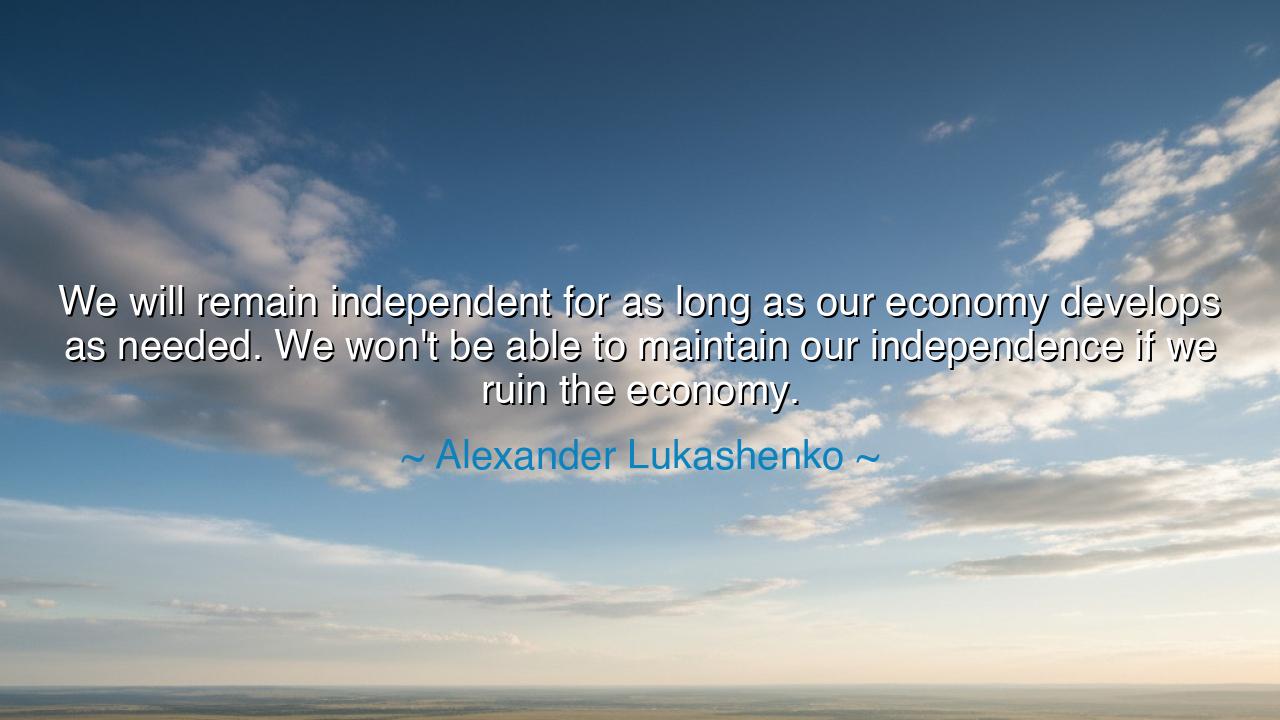
We will remain independent for as long as our economy develops as
We will remain independent for as long as our economy develops as needed. We won't be able to maintain our independence if we ruin the economy.






“We will remain independent for as long as our economy develops as needed. We won't be able to maintain our independence if we ruin the economy.” Thus spoke Alexander Lukashenko, the ruler of Belarus, a man whose words, though spoken in the modern age, echo a truth as ancient as civilization itself. His statement bears no poetry, yet within its plainness lies the wisdom of survival: that independence, whether of a nation or of a soul, cannot exist without strength, and that strength must rest not upon passion alone, but upon the firm foundation of prosperity. For freedom without sustenance is like a ship without a sail — noble in form, but doomed to drift and perish upon the winds of hardship.
To understand his meaning, we must recall the history from which it arose. Belarus, a land once caught between empires, found itself newly sovereign after the fall of the Soviet Union in 1991. Its independence was young, fragile, and surrounded by powerful neighbors. The people inherited not only freedom, but the weighty task of building an economy from the ruins of command and collapse. In that crucible, Lukashenko’s words took shape — a declaration that political liberty could not stand apart from economic stability, that a nation starving in chaos would soon sell its freedom for bread. Thus, his message was both warning and prophecy: to preserve sovereignty, one must first preserve the means of survival.
The ancients, too, spoke this truth. In the days of Rome, when senators debated the fate of their republic, the philosopher Cicero declared that “a nation cannot remain free if it is poor, nor virtuous if it is desperate.” For hunger breeds dependency, and dependency invites dominion. A people who cannot feed themselves must bow to those who can. So it has been through all ages — from the fallen city-states of Greece to the colonies of modern empires — the weak are not conquered first by armies, but by debt and scarcity. Lukashenko’s statement, whether uttered in calculation or conviction, reminds us that economic ruin is the silent invader that topples nations without battle.
Consider the lesson of Weimar Germany, where after the Great War, the collapse of the economy opened the gates to tyranny. When inflation devoured wages and bread became dearer than gold, the people turned from democracy to desperation, and from desperation to dictatorship. The banners that soon filled the streets were born not of ideology alone, but of hunger. Independence, though declared in law, was surrendered in spirit, for the mind cannot dwell on freedom when the stomach cries for food. In this way, economic failure does not merely wound the body of a nation — it corrodes its soul.
But Lukashenko’s words also carry a more personal resonance, for the principle he names applies not only to nations, but to every life. Independence, in its truest form, is the ability to stand upon one’s own labor — to create, to sustain, to endure. A man or woman who depends wholly upon others for sustenance may live in comfort, yet their spirit is bound by invisible chains. True freedom, whether of a people or an individual, demands the courage to build and the discipline to maintain. The ruin of one’s economy — whether the economy of a state or the economy of the soul — is the ruin of self-reliance.
Yet there is also warning hidden beneath his pragmatism. For while economic strength is the lifeblood of independence, it must not become its god. History teaches that nations obsessed only with profit often lose their soul before their freedom. The pursuit of prosperity must serve principle, not replace it. The wise ruler and the wise person alike must balance material survival with moral purpose. For wealth without integrity breeds decay just as surely as poverty breeds weakness. Independence, therefore, is not preserved by numbers alone, but by the harmony of justice and stability, of virtue and growth.
The lesson, then, is both clear and eternal: freedom must be fed, but never sold. A nation must build wisely, stewarding its economy with foresight, not greed. A people must labor not only for gain, but for resilience — so that when the storms of the world come, their independence does not crumble at the first tremor of want. And you, child of this restless age, must remember that your own liberty depends upon the same balance: work diligently, live prudently, and keep your heart upright. For the strongest fortress is not of stone or law, but of those who can sustain themselves in both body and spirit.
So take these words to heart: independence is not a gift, but a discipline. It must be earned each day through wisdom, work, and self-control. Guard your prosperity as the root of your freedom, but let not greed choke the tree of virtue. For the fate of nations and the fate of souls are alike — both remain free only so long as they are strong, wise, and just in the stewardship of their own foundations.






AAdministratorAdministrator
Welcome, honored guests. Please leave a comment, we will respond soon